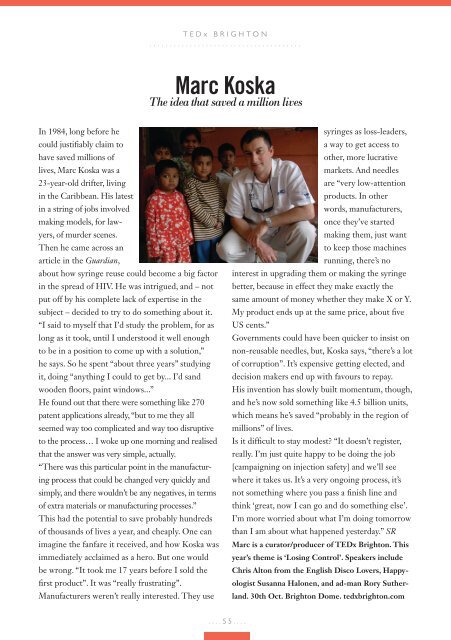Viva Brighton October 2015 Issue #32
- No tags were found...
Create successful ePaper yourself
Turn your PDF publications into a flip-book with our unique Google optimized e-Paper software.
tedx brighton<br />
......................................<br />
Marc Koska<br />
The idea that saved a million lives<br />
In 1984, long before he<br />
could justifiably claim to<br />
have saved millions of<br />
lives, Marc Koska was a<br />
23-year-old drifter, living<br />
in the Caribbean. His latest<br />
in a string of jobs involved<br />
making models, for lawyers,<br />
of murder scenes.<br />
Then he came across an<br />
article in the Guardian,<br />
about how syringe reuse could become a big factor<br />
in the spread of HIV. He was intrigued, and – not<br />
put off by his complete lack of expertise in the<br />
subject – decided to try to do something about it.<br />
“I said to myself that I’d study the problem, for as<br />
long as it took, until I understood it well enough<br />
to be in a position to come up with a solution,”<br />
he says. So he spent “about three years” studying<br />
it, doing “anything I could to get by... I’d sand<br />
wooden floors, paint windows...”<br />
He found out that there were something like 270<br />
patent applications already, “but to me they all<br />
seemed way too complicated and way too disruptive<br />
to the process… I woke up one morning and realised<br />
that the answer was very simple, actually.<br />
“There was this particular point in the manufacturing<br />
process that could be changed very quickly and<br />
simply, and there wouldn’t be any negatives, in terms<br />
of extra materials or manufacturing processes.”<br />
This had the potential to save probably hundreds<br />
of thousands of lives a year, and cheaply. One can<br />
imagine the fanfare it received, and how Koska was<br />
immediately acclaimed as a hero. But one would<br />
be wrong. “It took me 17 years before I sold the<br />
first product”. It was “really frustrating”.<br />
Manufacturers weren’t really interested. They use<br />
syringes as loss-leaders,<br />
a way to get access to<br />
other, more lucrative<br />
markets. And needles<br />
are “very low-attention<br />
products. In other<br />
words, manufacturers,<br />
once they’ve started<br />
making them, just want<br />
to keep those machines<br />
running, there’s no<br />
interest in upgrading them or making the syringe<br />
better, because in effect they make exactly the<br />
same amount of money whether they make X or Y.<br />
My product ends up at the same price, about five<br />
US cents.”<br />
Governments could have been quicker to insist on<br />
non-reusable needles, but, Koska says, “there’s a lot<br />
of corruption”. It’s expensive getting elected, and<br />
decision makers end up with favours to repay.<br />
His invention has slowly built momentum, though,<br />
and he’s now sold something like 4.5 billion units,<br />
which means he’s saved “probably in the region of<br />
millions” of lives.<br />
Is it difficult to stay modest? “It doesn’t register,<br />
really. I’m just quite happy to be doing the job<br />
[campaigning on injection safety] and we’ll see<br />
where it takes us. It’s a very ongoing process, it’s<br />
not something where you pass a finish line and<br />
think ‘great, now I can go and do something else’.<br />
I’m more worried about what I’m doing tomorrow<br />
than I am about what happened yesterday.” SR<br />
Marc is a curator/producer of TEDx <strong>Brighton</strong>. This<br />
year’s theme is ‘Losing Control’. Speakers include<br />
Chris Alton from the English Disco Lovers, Happyologist<br />
Susanna Halonen, and ad-man Rory Sutherland.<br />
30th Oct. <strong>Brighton</strong> Dome. tedxbrighton.com<br />
....55....


















